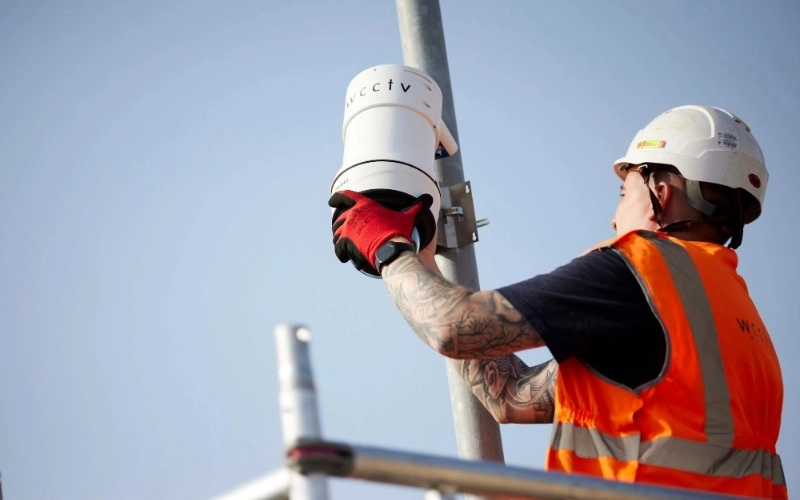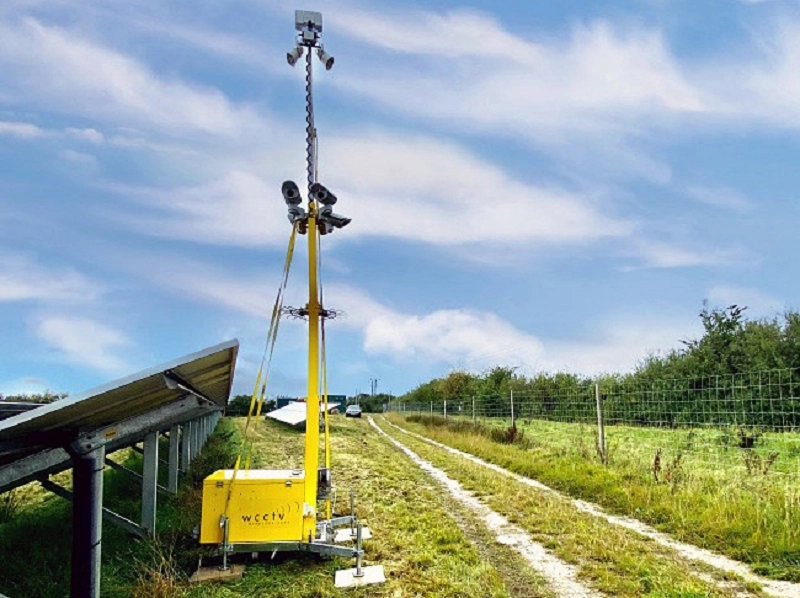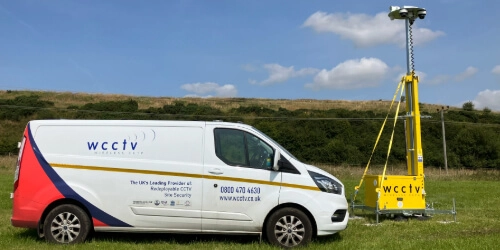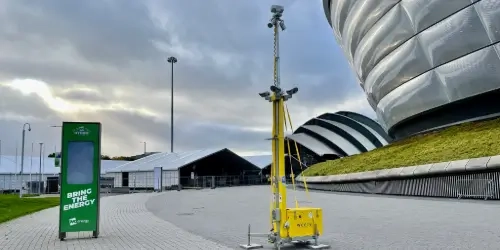NDAA-compliant cameras are becoming increasingly common in the UK, especially for Public Sector organisations. We explore why NDAA-compliance is important and the industries likely to require it.
With any security cameras and systems, there’s a high expectation regarding the quality of service and for certain organisations this involves being compliant with the National Defense Authorization Act (NDAA).
Although this Act originates from the USA, it’s a growing term amongst various businesses and agencies who now require it from surveillance companies to enhance their security.
Having supported the Public Sector and other agency types, we understand the importance of NDAA compliance and ensure our products use components in line with this.
However, to understand the importance of this compliance within certain organisations, it’s key that you know what the term, NDAA-compliant truly means and the reasons behind it.
What Does NDAA-Compliant Mean?
NDAA compliance refers to adhering to the requirements of the National Defense Authorization Act (NDAA), specifically Section 889 of the 2019 Act, which restricts the procurement of video surveillance equipment from certain Chinese companies.
Therefore, an NDAA-compliant camera is one that is not produced by any of the named Chinese manufacturers prohibited under Section 889.
The purpose of this legislation is to prevent potential vulnerabilities associated with security equipment.
Within the USA this is used to ensure federal agencies only utilise equipment that aligns under this Act, in turn minimising the security risks associated with certain surveillance equipment.
However, similar in the UK, organisations like Local Authorities, Councils and the Police may also seek out NDAA-compliant cameras for this reason also.
This is to ensure that the security they receive is of the highest-level and at minimal risk of any breach as the type of sensitive information they hold and individuals monitored must be protected.
Exploring NDAA-Compliant Security Cameras
If you have even a passing interest in security cameras in fields like Local Authorities, Housing Associations and the Police, you've likely encountered the term 'NDAA-Compliant.'
It may be that you're considering upgrading your security equipment and want to know what NDAA compliance means, what it regulates, and, perhaps most importantly, how it affects you.
This legislation is not in place in the UK, however, it is being introduced amongst various organisations and due to this, you should be aware of the expectations and key information surrounding this.
From the outset, you should know that research is key. Security equipment will vary from one manufacturer to the next, and can even differ within one manufacturer itself between products.
Research is the answer to ensuring that you understand the key features of what is required of security equipment if your organisation is looking to remain NDAA-compliant.
To assist, WCCTV answers some of the most common questions about NDAA-compliant cameras below.

What are the Benefits of Using NDAA-Compliant Cameras?
Although, this may not be direct legislation in the UK, there are still various benefits of utilising NDAA-compliant cameras, including:
Enhanced Cybersecurity
NDAA-compliant security cameras are specifically designed to be less susceptible to cyberattacks and data breaches, helping to protect footage and any sensitive information collected through this.
Equipment produced by certain manufacturers will be deemed to create greater risk than others due to the technology that may be utilised when creating the product.
Supply Chain Security
One of the key benefits of using an NDAA-complaint camera is that they do not compromise national security.
The manufacturers of self-certified NDAA-compliant cameras may perform testing to mitigate the risk of unauthorised access and protect sensitive data from potential breaches, enhancing the safety of equipment for companies using their products.
As such, involving yourself with an NDAA-compliant camera will help strengthen your supply chain as they aren’t being sourced from any manufacturers deemed higher risk.
Future-Proofing Investments
As of now, the NDAA is not currently in place in the UK, however, this isn’t to say this will not become its own legislation here, so preparing for the future can help save money and protect investments in the future.
The focus on security over recent years has increased and expectations are only likely to increase.
For businesses, this could mean changes will need to be applied with their security, so if you can work one step ahead you’ll be protecting your business in more ways than one.
Reliability and Performance
NDAA-compliant security cameras are typically provided by reputable manufacturers and often produced to the highest standards, meaning fewer failures, reduced maintenance costs, and more consistent performance.
This level of performance is often essential when considering the deployment scenarios for government agencies and critical infrastructure sites.
Reputational Protection
Engaging only in NDAA-compliant security equipment can help boost your reputation and maintain it to a good standard for your clients and customers.
For those potentially looking to use your business or existing customers, being compliant with the NDAA can help enhance trust and confidence for them, and amongst the business also.
Who Should Use NDAA-Compliant Cameras?
One of the first questions people have when exploring NDAA-compliant cameras is - do I need them even if the legislation is not in place in the UK?
It's important at this stage to understand that no business is currently required to follow this legislation legally, however, there may be some who prefer this.
In our opinion, everyone who wishes to prioritise the integrity, reliability, and security of their CCTV cameras should always opt for NDAA-compliant cameras if possible.
Generally, there are key industries and organisations that would particularly benefit. This could include:
- Local Authorities
- Councils
- Critical Infrastructure including water facilities, telecommunication and transportation hubs
- Police
- Housing Associations
- Organisations working alongside Government Agencies
- Environment Agencies
- Border Force
The main reason the above organisations and business types are recommended to use NDAA-compliant security equipment is due to the national importance related to these services and the high volume of sensitive information stored by them.
Non-compliance could increase the security threats they are faced with and if accessed, could damage your organisation, employees and clients.

How Can I Check if My Security Cameras are NDAA-Compliant?
To establish whether your security cameras follow compliance or not, the first step is to identify the make, model, and manufacturer of your surveillance equipment.
If you still have the original documentation for your equipment, you may be able to contact the manufacturer to check if they are compliant or verify this via their website.
You can also cross-reference against NDAA Section 899 where the names of all the banned manufacturers will be listed.
What if my Cameras Are Not NDAA-Compliant?
If you discover you are using non-compliant technology, your first step should be to familiarize yourself with the specific requirements and restrictions of the NDAA and ascertain how you can begin your journey towards compliant security.
As stated previously, there is no legal requirement to replace your equipment, however, if you are simply looking or have been advised to transition over then you should research how to approach this through the guidance provided.
Before replacing the equipment, you may wish to gain further understanding on the potential risks and impacts of using non-compliant technology - and the potential dangers they may pose.
If you decide that you either need or want to replace the non-compliant security equipment, then ensure you thoroughly look into which camera solutions are compliant before purchasing any new equipment.
Step up Your Surveillance With NDAA-Compliant Security Cameras
We understand the importance of NDAA-compliant security, even in the UK where the legislation is not currently in place legally.
Security needs to be at the core of any business and utilising non-compliant equipment could be creating more vulnerabilities than what already exists for you.
At WCCTV, we centralise our customers and their safety by ensuring all our products are NDAA-compliant, so you can have peace of mind from the get-go.
FAQs About NDAA-Complaint Security Cameras
What Makes a Camera NDAA-Compliant?
NDAA-compliant cameras do not use components from manufacturers that are prohibited under section 899 of the NDAA.
Are NDAA-Compliant Cameras More Expensive?
NDAA-compliant cameras may be more expensive due to their higher security standards, manufacturing quality and other factors. Any increased costs are offset by the reassurance of enhanced security and boosted reputation.
Is There an Official NDAA-Compliance Logo or Badge I Should Look Out For?
There are no official NDAA-compliant logos, badges or certificates that you should look out for when researching a security company to utilise.
Instead, you should refer to the legislation itself or directly ask the company yourself. Some security services may even list this on their website.




